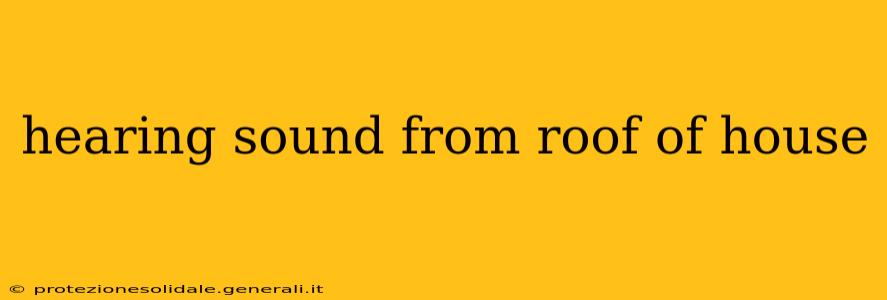Hearing unexplained noises coming from your roof can be unsettling. It's a common concern, sparking worries ranging from minor annoyances to significant structural issues. This comprehensive guide will help you identify the potential sources of these sounds and determine the best course of action. We'll explore various possibilities, from the mundane to the more serious, enabling you to address the issue effectively and regain peace of mind.
What Could Be Making That Noise on My Roof?
This is often the first question homeowners ask. The source of roof sounds can vary widely depending on the season, weather conditions, and the age and construction of your home. Let's explore some common culprits:
Animals:
- Squirrels: These acrobatic creatures are notorious for scampering across roofs, especially during the day. Their movements can create scratching, scurrying, and rustling sounds. They may also be nesting in your attic or under the roof shingles.
- Birds: Similar to squirrels, birds can create tapping, pecking, and chirping noises, particularly if they've built a nest under your shingles or in the gutters. Nesting season is a prime time for this.
- Raccoons: These larger mammals are more likely to cause banging or thumping sounds as they navigate your roof. They may also damage shingles while searching for entry points.
- Rodents: Mice and rats can create scratching and scurrying sounds within your walls or attic, which can sometimes be heard emanating from the roof area.
Environmental Factors:
- Wind: Strong winds can cause rattling, whistling, or creaking sounds as they buffet your roof and gutters. Loose shingles or damaged flashing are particularly prone to making noise in windy conditions.
- Rain: Heavy rainfall can create drumming or splashing sounds on your roof, particularly if there are leaks or standing water. Gurgling sounds might indicate clogged gutters.
- Temperature Changes: The expansion and contraction of roof materials due to temperature fluctuations can cause popping or creaking sounds. This is especially common in older homes.
- Tree Branches: Branches rubbing against your roof, especially during windy conditions, can produce scraping or scratching sounds.
Structural Issues:
- Loose Shingles: Loose or damaged shingles can rattle in the wind, creating a tapping or clicking sound. This is a serious issue that needs immediate attention to prevent water damage.
- Cracked or Shifting Roof Trusses: In more severe cases, structural problems like cracked or shifting roof trusses can cause groaning, creaking, or popping sounds. This requires immediate professional inspection.
- Debris: Accumulated leaves, twigs, or other debris can create rustling or scraping noises, particularly when disturbed by wind.
How Can I Identify the Source of the Roof Noise?
Pinpointing the source requires careful observation and investigation:
- Timing: Note when you hear the sounds. Are they most frequent during the day, night, windy conditions, or rainfall?
- Location: Try to pinpoint the area on the roof where the sound seems to originate.
- Visual Inspection: If possible and safe, perform a visual inspection of your roof from the ground or a ladder (with appropriate safety measures). Look for signs of damage, animal activity, or loose debris. Do not attempt this if you are uncomfortable with heights or lack experience.
- Attic Inspection: Check your attic for signs of animal entry points, droppings, or nesting materials.
What if I suspect an animal is on my roof?
If you suspect animal activity, it's crucial to:
- Identify the animal: This helps determine the appropriate course of action.
- Do not attempt to remove the animal yourself: Unless you are experienced in animal removal, contacting a wildlife removal professional is best. Attempting to remove an animal yourself can be dangerous for both you and the animal.
- Seal entry points: Once the animal is removed, seal all potential entry points to prevent future infestations.
What should I do if I hear creaking or popping sounds from my roof?
Creaking or popping sounds may indicate a structural issue that requires professional attention. Contact a qualified roofing contractor or structural engineer for an inspection. Delaying action could lead to further damage and more costly repairs.
My roof is leaking – what should I do?
A leaking roof is a serious issue that requires immediate attention to prevent extensive water damage. Contact a roofing contractor as soon as possible for repairs.
This guide provides a starting point for investigating roof noises. Remember, safety is paramount. If you're uncomfortable performing any inspections yourself, or if the issue seems serious, always contact a qualified professional. Early detection and prompt action can prevent minor issues from escalating into costly repairs.
